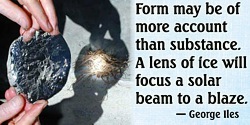|
George Iles
(1852 - 1942)
author and populariser of science who wrote articles for Popular Science Monthly with topics including mathematics, physics and heredity. He also published several books on science and invention, as well as editing a series of short autobiographies, and Canadian Stories. Outside of his written record, it seems little remains known about him.
|
George Iles
“Superstition is a premature explanation”
Illustrated Quote - Large (800 x 400 px)
More George Iles quotes on science >>
George Iles ended his book Canadian Stories with a chapter of his own aphorisms as 'Jottings from a Notebook'. Many are collected on the Science Quotes by George Iles page. About the subject quote above, being a random thought complete in itself, there is no more context to give. But there are some other entries in his 'Jottings' that do not appear on the quotes page worth commenting upon.
“Nobody ever did people any good by standing aloof. If the pencils of an electric lamp are to shine they must first touch and then keep close together.”
For this quote to make sense to a modern reader, it must be realized that in his time, people would still be familiar with one of the early form of electric illumination - the arc light. This required two pointed pencil-like carbon rods, connected to each pole of a source of high-current electricity. These lamps had an adjustment to bring the points sufficiently close that an arc would spark across the gap. As the tips of the carbon rods burned away, the rods would be advanced to maintain the arc. A mechanism of some kind built into the lamp would take care of this so that a brilliant, steady light would continue to be produced. When Thomas Edison introduced his incandescent filament lamps, which turned on and off with the flick of a switch, arc lamps were quickly replaced.
“Nothing cools so fast as undue enthusiasm. Water that has boiled freezes sooner than any other.”
This idea, about boiled water freezing faster than fresh water, shows that this conundrum was current even when this book was published a century ago. It remains a favorite try-at-home school experiment, and a subject for serious research papers.
“Degree is much: the whole Atlantic might be lukewarm and never boil us a potato.”
Another scientific notion based on the difference between heat and temperature. Cooking a potato needs a boiling temperature, and a certain amount of heat. By comparison, the Atlantic Ocean contains a vast amount of heat energy (which interacts with the atmosphere), yet its temperature is nowhere near boiling. Just as well for swimmers at the beach!
- Science Quotes by George Iles.
- George Iles - context of quote “A lens of ice will focus a solar beam” - Medium image (500 x 250 px)
- George Iles - context of quote “A lens of ice will focus a solar beam” - Large image (800 x 400 px)
- George Iles - context of quote “Superstition is a premature explanation” - Medium image (500 x 250 px)









